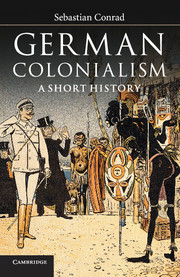Book contents
- Frontmatter
- Contents
- Illustrations
- Maps
- Acknowledgements
- Chapter 1 Introduction
- Chapter 2 Colonialism before the colonial empire
- Chapter 3 Pressure groups, motivations, attitudes
- Chapter 4 The German colonial empire
- Chapter 5 The colonial state
- Chapter 6 Economy and work
- Chapter 7 Colonial society
- Chapter 8 Knowledge and colonialism
- Chapter 9 The colonial metropole
- Chapter 10 Colonialism in Europe
- Chapter 11 German colonialism and its global contexts
- Chapter 12 Memory
- Chapter 13 Selected readings
- Index
- References
Chapter 5 - The colonial state
Published online by Cambridge University Press: 05 June 2014
- Frontmatter
- Contents
- Illustrations
- Maps
- Acknowledgements
- Chapter 1 Introduction
- Chapter 2 Colonialism before the colonial empire
- Chapter 3 Pressure groups, motivations, attitudes
- Chapter 4 The German colonial empire
- Chapter 5 The colonial state
- Chapter 6 Economy and work
- Chapter 7 Colonial society
- Chapter 8 Knowledge and colonialism
- Chapter 9 The colonial metropole
- Chapter 10 Colonialism in Europe
- Chapter 11 German colonialism and its global contexts
- Chapter 12 Memory
- Chapter 13 Selected readings
- Index
- References
Summary
Although the era of colonial power, and especially that of German colonialism, was a short one, it had one long-lasting effect: it led to the creation under international law of territorial states that aspired to a state monopoly on power and to fixed external borders. This took place in regions where boundaries had previously been imprecise and constantly changing, and where there had been a wide variety of different types of political order with very different degrees of centralization. Especially in Africa, German colonization introduced a completely new principle of political organization, which was reinforced under British and French rule after the First World War.
The colonial states controlled by the German empire were set up in a belief that the model of European state systems could simply be applied to the colonies. But in fact the practice on the ground turned out to be very different from the theory. The colonial state was not simply an extension of the western European model, but, as Jürgen Osterhammel suggests, ‘a political form in itself’. And colonial states themselves were organized in a variety of very different ways. Even the laws and regulations that were applied differed greatly from one colony to the next. The structures of colonial power varied according to regional differences and different types of colony, and they followed different chronologies. But they were also affected by local geography and by the dynamics of local societies. The level of control desired by the colonial state also depended on the objectives being pursued for each colony. In trading colonies like Togo, the state’s presence was limited to a small number of administrators whose task was primarily to secure the economic exploitation of the region. By contrast, in settlement colonies such as German South-West Africa and plantation colonies such as Cameroon, the presence of German settlers and the demands for labour by German landowners led to the state taking more control over local territories. In addition, any analysis of colonial power needs to differentiate between different time periods, because the structures of colonial state power changed – drastically in some cases – during even the short period of German domination.
- Type
- Chapter
- Information
- German ColonialismA Short History, pp. 66 - 87Publisher: Cambridge University PressPrint publication year: 2011



